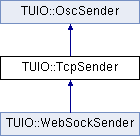TUIO::TcpSender Class Reference
#include <TcpSender.h>
Inheritance diagram for TUIO::TcpSender:

Public Member Functions | |
| TcpSender () | |
| TcpSender (const char *host, int port) | |
| TcpSender (int port) | |
| virtual | ~TcpSender () |
| bool | sendOscPacket (osc::OutboundPacketStream *bundle) |
| bool | isConnected () |
| virtual void | newClient (int tcp_client) |
| const char * | tuio_type () |
 Public Member Functions inherited from TUIO::OscSender Public Member Functions inherited from TUIO::OscSender | |
| OscSender () | |
| virtual | ~OscSender () |
| bool | isLocal () |
| int | getBufferSize () |
Public Attributes | |
| int | port_no |
| int | tcp_socket |
| std::list< int > | tcp_client_list |
| bool | connected |
Protected Attributes | |
| char | data_size [4] |
| char | data_buffer [MAX_TCP_SIZE+4] |
| pthread_t | server_thread |
 Protected Attributes inherited from TUIO::OscSender Protected Attributes inherited from TUIO::OscSender | |
| unsigned int | buffer_size |
| bool | local |
Detailed Description
The TcpSender implements the TCP transport method for OSC
- Version
- 2.0.a0
Constructor & Destructor Documentation
◆ TcpSender() [1/3]
| TcpSender::TcpSender | ( | ) |
The default constructor creates a TcpSender that sends to the default TUIO port 3333 on localhost
◆ TcpSender() [2/3]
| TcpSender::TcpSender | ( | const char * | host, |
| int | port | ||
| ) |
This constructor creates a TcpSender that sends to the provided port on the the given host
- Parameters
-
host the receiving host name port the outgoing TUIO TCP port number
◆ TcpSender() [3/3]
| TcpSender::TcpSender | ( | int | port | ) |
This constructor creates a TcpSender that listens to the provided port
- Parameters
-
port the incoming TUIO TCP port number
◆ ~TcpSender()
|
virtual |
The destructor closes the socket.
Member Function Documentation
◆ isConnected()
|
virtual |
This method returns the connection state
- Returns
- true if the connection is alive
Implements TUIO::OscSender.
◆ newClient()
|
virtual |
This method is called whenever a new client connects
- Parameters
-
tcp_client the socket handle of the new client
Reimplemented in TUIO::WebSockSender.
◆ sendOscPacket()
|
virtual |
This method delivers the provided OSC data
- Parameters
-
*bundle the OSC stream to deliver
- Returns
- true if the data was delivered successfully
Implements TUIO::OscSender.
Reimplemented in TUIO::WebSockSender.
The documentation for this class was generated from the following files:
- TcpSender.h
- TcpSender.cpp
